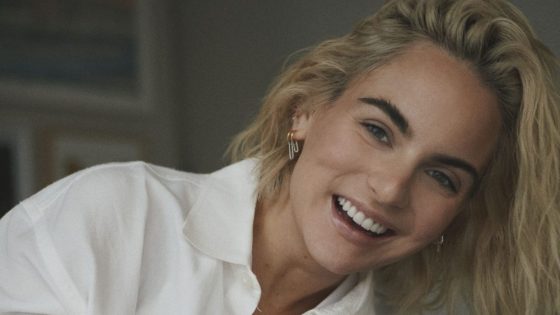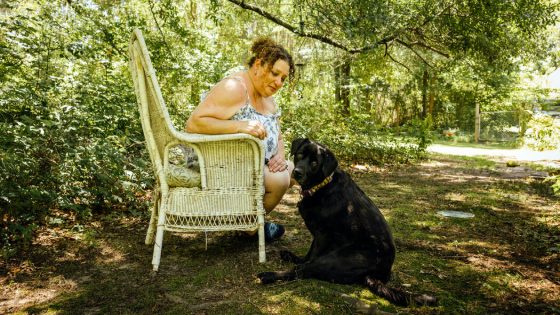For Joanna “JoJo” Levesque, life has been a series of scraping highs and deep lows. On the surface, the singer was once the portrait of the American dream: a record deal at 12 years old, two hit albums with smash singles permanently etched into the pantheon of modern pop classics, acting roles in major films alongside Robin Williams and Emma Roberts. But the momentum slowed — for every win she stacked in her teenage years, she faced a cascade of setbacks that left her consistently questioning not only her future in the music industry but also her faith in the world and, frequently, those closest to her.
Levesque traces the arc of her tumultuous life in her debut memoir “Over the Influence,” out today via Hatchette Books. Applied to her story, the title nods to the themes permeating through the narrative: her parents’ addictions and how they affected her; the overbearing hands of the music industry guiding her career and artistic decisions; and the influence that her own emotions had in prompting periods of depression and self-destruction.
“It was definitely cathartic and just an exercise in getting over my fear of being seen, of putting myself out there,” Levesque, 33, tells Variety of “Over the Influence,” which she wrote in 18 months based on journals she kept throughout the years. “Is my story interesting enough? Am I capable of telling it? And then knowing that I needed to break through any of those roadblocks that I put before myself.”
“Over the Influence” is a visceral and candid read, told with clarity and self-awareness. For those who have kept tabs on her career, the memoir offers revealing glimpses into her rise as a young, promising pop star faced with countless obstacles, from bumping up against her reluctant manager mother to getting pushed off by her record label Blackground Records. As she winds through her story, she recalls tales of substance abuse, hot-blooded relationships and a resilient path to regain control of her career, often deterred by executives switching labels or overbearing managers.
With tales of almost signing to Britney Spears to re-recording her first two albums as a way to finally gain control, Levesque lays it bare in “Over the Influence,” a cautionary tale about how having talent is just one small piece of a much larger puzzle in maintaining a sustainable career in the music industry.
Writing a memoir at 33 means you’ve lived a lot of life thus far. How did the idea of putting this book together spark for you?
Well it’s exactly where it came from, just realizing that in this year, my 33rd year, that it’ll be 20 years since my first album. Most people my age haven’t been doing one thing for 20 years, haven’t been in a career for 20 years. So I think the origin for it is that, I spent so much of my life, the majority of my life, feeling so confused and feeling like, what am I doing, what does this mean, what has been happening? I feel like I’ve been just moved around and there was a lot of confusion. So I think I wanted to make sense of it by putting it down on paper. I realized a lot of themes as I was writing this, things that kept recurring over and over again in my life, maybe things I was blind to at the time.
A recurring theme in the book, which many will be surprised to learn, is that you’ve been consistently unsure of your lead singles. Even calling back to “Leave (Get Out),” you weren’t entirely sold. It brought up the idea of control, or lack thereof, over your career. What was it like interrogating those moments with your music and people telling you to go one which way?
Well, it’s a little nerve-racking to share how unsure I felt for a lot of my career. I felt very convicted in certain areas but felt I didn’t have the support to fight for what it is that I felt in my heart, and then questioning, is what’s in my heart what I should go for or do I listen to the opinions of those who have had a lot of success over and over again? I think when something worked in a really big way at a very young age, and you weren’t sure about that, that just set the tone for me. Like, other people know better. So it’s been a confusing journey since then, because yeah, I didn’t love my first single for the first few months of it. And then when other people started loving it, I was like, OK so I’m wrong and I can find something to like about this. Eventually, I did love it and I’m grateful for it and I have a great time with it and I connect to it a lot more, because I’ve gone through a lot of shit.
There are some deeply personal moments in this book about your mother and father, recounting the fights you had and the efforts you made to help them. What was it like revisiting those memories, putting them into words, and making yourself so vulnerable?
Really the most important thing was that my mom is OK. So I tried to handle that with a lot of compassion and empathy, but also, it was a real hinge point in my life because I did feel like I was responsible for my parents’ happiness, well-being, even being alive. And I think that’s way too much pressure, and I think I wanted to share that because I know I’m not the only person who’s been a bit parentified as a child, and the more I talk about it, the more other people tell me that they’ve had experiences like that. You really never know what someone’s going through. Outwardly, they can be on top of the world, but they can be going through a lot of things behind the scenes. So yeah, I am really curious though how people respond to those things, because I love my parents. I’ve hurt people, I’ve been hurt, that’s just what I wanted to talk about, is that we’re capable of a bunch of different shit.
You come across as very measured discussing your career, particularly when it came to Blackground and trying to get out of that limbo space with them. Was that a concerted approach in writing the book, to remain measured?
No, that’s not a concerted effort in the book. I think if I made this book more salacious, it might sell more copies but that’s just not who I am. But I’ve done so much work to be able to feel OK in the past 10 years, and the truth is that at times, I felt like a victim, at times, I’ve been a villain. Different scenarios. So there were times where I was really, really angry. Where I was really bitter and so numb and so angry and so self-righteous and entitled that I could barely fucking move. The truth is though, I don’t think that I’d be able to have this life that I love and enjoy and the access and the career and the connectedness I have with my fans if it weren’t for Blackground, if it weren’t for [producer] Vincent [Herbert], for the people who allowed me to have that impact. It took their belief. So it wasn’t really measured. Another truth is that it was drilled into me so hard during that lawsuit not to talk shit, and that there were scary things going on behind the scenes that I had to be concerned about my safety that it’s just a part of me now.
The book leaves out some moments from your life, like being up for the lead on “Hannah Montana,” but you do include memories of almost signing with Britney Spears. What was the process of discerning what made the most sense to tell your story?
It was just kind of what I thought was important to me. I wanted to share things that I’ve not really talked about. I would say that was the discernment there, that it was things that people who have been supporting me for a long time might have been wondering, why didn’t you act more? It’s because I was so fucked up at the time. I was submitting auditions and just crashing and burning and not really putting my best foot forward, because I was so deeply depressed. I wanted to share some things behind the scenes, but also life is not all about what you see. It’s about what’s going on behind the scenes, and that’s what interests me. I wanted to talk about some of those things around the “Jumping Trains” era, the album that never came out, and why “Mad Love” feels a bit disjointed. I wanted to speak to things that I wanted my fans to know.
In the book, you talk about the video for “The Other Chick” that never came out and recording 200 songs that are collecting dust somewhere.
I’m so affected by that, I really am.
In a bad way?
I don’t want to think about things in those terms. I’m deeply hurt by it. It hurt me. It taught me how to not get too excited for things. How to be measured. How to not count my chickens before they hatch. How to not get too attached to anything. And definitely with “The Other Chick” not coming out and me compromising and being like, yeah we can put this song out… It’s a dope song but I was uncomfortable with the subject matter at the time, it felt a little weird to me. And then losing all that weight for the music video and still being told I didn’t look good enough, that was pretty hurtful. I don’t know how else to say it. It didn’t feel right.
The end of the book portrays you in a good place, where you find peace in all of this, because it feels like so much of the story is about turmoil and uncertainty. So in a general sense, do you feel like you’re in a better spot now having looked back at everything that you’ve been through?
Making it to my 30s is a gift, for making it through my 20s. I definitely feel so much more comfortable and confident about who I am, where I am, what I’ve been and owning it all. I definitely feel much, much better and less afraid. I was so scared, and I think that when your biggest fears come to pass, when you’ve lost your position in your career, where you’ve lost people that are close to you, when you feel like it’s just a shit show… I’ve been there. And that’s why moments of joy and peace and connectedness mean so much to me now, because it’s not always like that. It wasn’t always like that. And I think it’s my gratitude, just something I believe and hold close to me. There’s a lot of confusion, and I don’t let that into my system as much anymore.
What’s next for you musically?
I’m putting out new music soon. After I did “Moulin Rouge” last year, I went to the studio and I started working on some stuff. Living in New York feels super inspiring to me, and so I’m putting out new music soon and then wanting to tour it. I really miss doing my own music. It’s fun doing this jukebox musical and singing a million other people’s songs, but I miss singing my own stuff. So that’ll be soon.
Source Agencies



